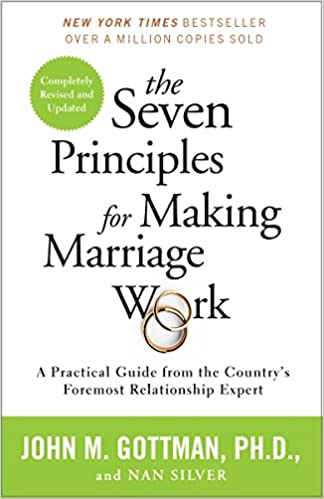Listen to this episode of the Focus with Marlene Podcast:
Get caught up with all episodes in the Developing a New Focus series.
“The truth is rarely pure and never simple.”
—Oscar Wilde
Note: The information presented here comes from the books, The Seven Principles for Making Marriage Work, and A Couple’s Guide to Communication, by Dr. John Gottman.
When we get married, we believe that life will be good from now on. “I have my loved one by my side.”
And yet, while everything seems to be going smoothly, we find ourselves disagreeing more, having more passionate arguments, and spending less pleasant time together.
Life can change in what seems like the blink of an eye; we don’t have enough money in the bank to cover our credit cards, everybody keeps giving us advice we didn’t ask for, and we suddenly find ourselves working longer and longer each day, with little time to spend together in pleasant activity or just enjoying each other’s company.
We are not only arguing more, but it seems our tempers are on a short string and anger becomes more the norm than the exception. We talk about our troubles with others instead of with each other to get validation, sympathy, and support, but not resolution.
And the scene is set for more serious troubles.
Nowhere is communication more important between couples as it is during such times. Without the ability to communicate effectively about our frustrations, and what we want and need, difficulties will settle in.
Until we learn to hear the other person’s point of view, frustrations, wants and needs, there will be more and more misinterpretations and misunderstandings.
In The Seven Principles for Making Marriage Work, Dr. John Gottman lays out in a practical format seven principles for making a marriage work. The principles are based on years of research and study in his Seattle-based clinic, The Gottman Institute.
 It is a book easy to understand and follow and I recommend to anyone who is trying to develop a more “harmonious and long-lasting relationship” with their spouse. The exercises he presents, along with the information offered, are easy to follow and apply and have proven helpful.
It is a book easy to understand and follow and I recommend to anyone who is trying to develop a more “harmonious and long-lasting relationship” with their spouse. The exercises he presents, along with the information offered, are easy to follow and apply and have proven helpful.
According to Dr. Gottman, marriages can work when couples spend more time building a loving friendship than finding fault with each other. Happy marriages are based not just on friendship, but on a mutual respect and enjoyment of their spouse.
They know each other intimately – likes, dislikes, personality quirks, hopes, and dreams – and express fondness in big and little ways every day. They find ways to stay connected and maintain that friendship.
When things go wrong in a marriage
When things go wrong, couples need to have a strategy in place to repair their relationship. Sometimes that strategy is something they say or an action, silly or otherwise, that prevents escalation of arguments and defuses ongoing arguments.
Couples need to work together to strengthen their friendship and neutralize negative circumstances. It is this marital friendship that keeps them together. To do this, however, requires couples maintain a deep sense of intimacy. They don’t just “get along,” but they support each other’s hopes, dreams, and aspirations. Together, they build a sense of purpose for their lives while honoring and respecting one another.
Entering the Danger Zone – Predicting Potential Divorce

Gottman indicates that a marriage will die when neither spouse recognizes the value of their marriage, and both take the marriage for granted. When couples stop nurturing one another, they soon lose respect for each other and become negative and sarcastic. They are entering a danger zone.
It is not just anger, but a simmering ongoing dislike and rage.
It is not just arguing or fighting – it is developing contempt for their partner.
Within the first 15 minutes of a therapy session, Dr. Gottman says he can predict up to 91% accuracy whether a couple will end up in a divorce. He lists six signs or indicators that divorce is on the horizon with the seventh being the ending.
First Sign: “Harsh startup”
How do couples begin their conversations? When discussions or arguments begin with negative, accusatory, sarcastic, or blaming comments, the focus is not on problems that can be worked on and resolved, but on themselves. A harsh startup relates to failure.
Second Sign: “The 4 Horsemen of the Apocalypse”
Gottman defines these as “criticism, contempt, defensiveness and stonewalling.” The presence of the “4 horsemen” predicts divorce with 82% accuracy.
Criticisms are negative words that denigrate the character or personality of your spouse, amounting to character assassination. Complaints don’t just target behaviors, but belittle, scorn, and vilify the other.
When we are in contempt of our partner, we maintain an attitude of disgust, sarcasm and cynicism that includes name-calling, eye-rolling, sneering, mockery, and hostile humor. We consider our spouse either worthless or inferior and not worthy of respect.
Contempt is poisonous because it leads to more conflict instead of reconciliation and is fueled by long-simmering negative thoughts about your partner. It includes belligerence, which is a form of aggressive anger that contains a threat or provocation and becomes an extremely toxic brew when it has been allowed to ferment and develop.
When we are constantly on the defensive, we blame our partner for everything that happens. No matter what our spouse says, it is immediately construed as an attack, and we remain ready to counter-attack. There is no problem-solving or negotiation – just attack and defend.
Eventually, one partner will tune out, disengage, or turn away to avoid a fight. This is referred to as “stonewalling.” When someone is stonewalling, they will look away, up or down, and become as impassive as a “stone wall.” They will act as though they could care less.
This is more common with men. As this destructive cycle continues, individuals will refuse to cooperate, will avoid questions, and create delays. They no longer are interested in discussion, negotiation, or resolving disagreements.
Third Sign: “Flooding”
Gottman believes that people stonewall because they are flooded with emotions they do not know how to handle. Criticism, contempt, or defensiveness become so overwhelming that they leave the person shell-shocked. The more times you are flooded with criticism or contempt, the more hyper-vigilant you become. To survive and protect yourself, you disengage emotionally from the relationship.
Fourth Sign: “Body Language”
When under attack, there is an overriding physical distress: the heart rate escalates, blood pressure rises, and sweating occurs. This internal distress and stress trigger the fight/flight response, and you are unable to process information or problem-solve. You are in survival mode of either fighting or fleeing.
Fifth Sign: “Failed Repair Attempts”
We make repair attempts to decrease emotional tension and lower stress levels. Without these, we end up in a continuous feedback loop and downward spiral. This failure of repair attempts in a marriage is an accurate marker for potential divorce. When there are no attempts to repair, this prediction reaches about 91% accuracy. Repair attempts will work when there is a healthy relationship between spouses.
Sixth Sign: “Bad Memories”
When the relationship is consumed by negativity, couples rewrite their past history as well. They no longer are able to remember anything positive about their relationship and can remember little of their past.
Is there any hope?
While there may be predictive signs of a potential breakup, when two people really want to change and work together, they can do so.
Sometimes we think if we just leave and start over again our lives will be different and we will be happy. We forget, however, that we take with us the remnants of previous broken relationships and unless we work through them, we repeat previous behaviors.
If you find yourself in this situation, please seek the help of a trained counselor to help you work through the issues that keep you conflicted.

